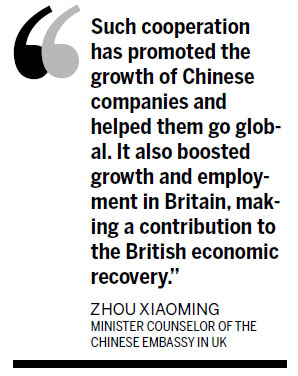China's investment in UK is 'strong'

China's investment in the United Kingdom has maintained strong momentum this year, especially in infrastructure and real estate, a senior Chinese diplomat said.
"The UK has been China's leading investment destination in Europe," said Zhou Xiaoming, minister counselor of the Chinese embassy in the UK.
So far this year, Chinese investment and acquisitions in the UK have exceeded $2 billion, Zhou said.
Chinese companies are also expanding their areas of cooperation in Britain, moving from traditional finance, trade and telecommunications to advanced manufacturing, infrastructure, branding and research and development.
"Such cooperation has promoted the growth of Chinese companies and helped them go global. It also boosted growth and employment in Britain, making a contribution to the British economic recovery," Zhou added.
Since the beginning of 2013, there has been a wave of deals between China and Britain, including:
Zhejiang Geely Holding Group in February acquired the principal assets of Manganese Bronze Holdings, owner of the London Taxi Co.
In May, Chinese commercial developer Advanced Business Park (China) Holdings Group Co Ltd signed a $1.51 billion deal with Boris Johnson, the mayor of London, to develop a 14-hectare complex of offices and shops at the Royal Albert Dock.
Infrastructure and real estate were "hot spots" for Chinese companies in the first half, said Zhou. Some of the other deals included:
Dalian Wanda Group Corp Ltd, one of China's largest and most ambitious conglomerates, closed two deals in June in the UK, investing 700 million pounds ($1.08 billion) to build a five-star hotel by the River Thames and buying 92 percent share of Sunseeker Yachts for 320 million pounds.
Chinese insurer Ping An Insurance (Group) Co of China Ltd bought the landmark London home of insurance market Lloyds of London for 260 million pounds in early July.
Private Chinese tire maker Shangdong Yongtai Chemical Group Co acquired a majority stake in Covpress International Holdings, a UK-based supplier of body panels, in August.
Zhou added that Chinese companies are encouraged by Britain's open markets. They have either acquired strategic assets to boost their own brands and technology or scaled up their R&D spending in Britain.
Zhou noted that China and Britain signed a currency swap line with an upper value of 21 billion pounds in June, China's first currency swap agreement with a major developed country. The agreement was a big step forward in London becoming a center for offshore yuan business, Zhou said.
Despite the difficulties posed by the European debt crisis and protectionism, Sino-UK bilateral merchandise trade grew 2.6 percent in the first half to $30.3 billion, Zhou said.
China's exports to Britain rose 2 percent to $21.7 billion, while imports from Britain jumped 4.4 percent to $8.6 billion.
Analysts noted that China and Britain have complementary economies. Britain has abundant experience in the service and creative industries and technical innovation, while China, as an emerging market, offers a large potential market.
"There is huge potential for cooperation between China and Britain," Zhou concluded.

























